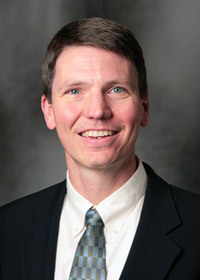 Timothy Fuerst
Timothy Fuerst
Timothy Fuerst, one of the most-cited economists in the world, is joining the University of Notre Dame this fall as William J. and Dorothy K. O’Neill Professor of Economics.
Fuerst’s appointment is the “crown jewel” in a series of recent hires that will bring even greater depth and diversity to the rapidly growing Department of Economics, says Chair Richard Jensen, the Gilbert F. Schaefer Professor of Economics.
“Tim’s research ranks him in the top 3 percent of the most-cited economists,” Jensen notes. “In addition to his world-class research on how credit constraints can exacerbate recessions, his long-standing affiliation with the Federal Reserve Bank brings real-world experience with the formation of monetary policy into the classrooms at Notre Dame.”
Joining Fuerst are three new assistant professors, Jensen says. "Wyatt Brooks adds to our depth in macroeconomics and international economics, Andreas Hagemann to our depth in econometrics, and Sarah Miller to our depth in applied microeconomics and health economics.
“Last year was a great one for recruiting new faculty. Because the number of economics majors has more than tripled in the last decade and because we service more than 400 business majors every semester, we have a need to expand our faculty in all areas to maintain reasonable class sizes and provide the variety of electives our majors deserve.”
Fuerst’s intellectual contributions have revolved around developing theoretical models for monetary policy and business cycle analysis, including what happens when financial markets go awry and liquidity is in short supply. Two of his most-cited papers outline the now-classic “liquidity effects” and “agency cost” models.
“Both of these issues were important features of the Great Recession of 2008,” Fuerst says. “It is quite humbling to think that my work can shed some light on these events.”
A large portion of his other research involves understanding features of monetary policy rules that encourage economic stability, he says.
Fuerst, who received his Ph.D. from the University of Chicago and served as a senior economic adviser with the Federal Reserve Bank of Cleveland, will teach graduate courses at Notre Dame in monetary theory and policy, with a special emphasis on business cycles and financial markets. At the undergraduate level, he will teach courses in macroeconomics.
“I am simply delighted to join a group of economists who are building a pre-eminent economics department at a great Catholic university,” he says. “I am eager to be part of this intellectual journey.”
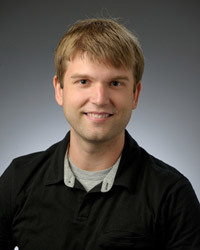 Wyatt Brooks
Wyatt Brooks
Assistant Professor Wyatt Brooks focuses his research on the role international trade plays in the growth of developing countries.
“China, for instance, has experienced a huge increase in national income and, at the same time, an even larger increase in international trade,” Brooks says. “This pattern is true in many other countries that have had similar increases in growth in the post-war period. This observation raises many important questions: Is international trade crucial for growth, or is trade a byproduct of growth? If trade is important, why does trade liberalization not always lead to growth?
“I study detailed trade data across many liberalizing countries to try to find answers to these questions.”
Brooks, who received his Ph.D. in economics from the University of Minnesota, will be teaching principles of macroeconomics this semester.
“My goal for the course is to introduce students to fundamental concepts in macroeconomics through discussion of current events,” he says. “I plan to use the current debt crises in Europe, the late-2000s recession, the growth of China, and the ongoing actions of the Federal Reserve as starting points to discuss sovereign debt, business cycles, the financial system and fiscal and monetary policy.”
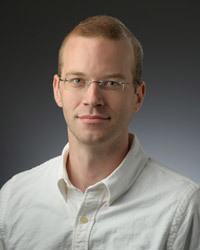 Andreas Hagemann
Andreas Hagemann
Research from new assistant professor Andreas Hagemann focuses on applications of the “bootstrap,” a method for improving the reliability of statistical estimates.
“My work lies at the interface between economics and mathematical statistics,” Hagemann says. “I develop new tools for economists to test economic models, to make well-founded predictions and decisions, and to compare theoretical results with actual data.
“I always loved econometrics for its clarity and precision. When you put your research and teaching on rigorous mathematical foundations, there is very little room for purely philosophical disagreements,” he says. “You are either right or wrong.”
Hagemann, who received his Ph.D. in econometrics from the University of Illinois, will teach an undergraduate class in econometrics this semester that introduces students to “the theory behind standard statistical tools that economists use to, for example, predict real estate prices or evaluate the effect of policy reforms.”
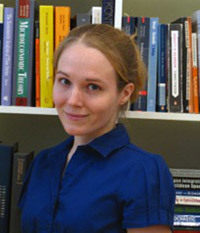 Sarah Miller
Sarah Miller
Sarah Miller, who will join the Department of Economics as an assistant professor in January 2014, is currently a Robert Wood Johnson Foundation Scholar in Health Policy Research, a post-doctorate program at the University of Michigan. She received her Ph.D. in economics from the University of Illinois.
Miller’s research is in the area of public economics, with a focus on health economics and consumer credit.
“These topics appeal to me because they have the potential to inform and improve public policy,” she says. “For example, my dissertation research analyzes how expanding health insurance coverage to the uninsured affects their decision to use the hospital emergency room for non-urgent care.
“I used data from a major health care reform that occurred in Massachusetts in 2006, which in many ways served as the basis for the Affordable Care Act. My research demonstrates that the provision of insurance coverage to the uninsured can affect where they seek care in potentially cost-reducing ways.”
At Notre Dame, Miller says, she plans to teach courses on both public economics and health economics.
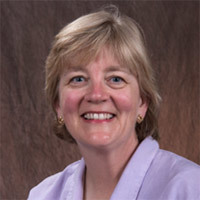 Mary Flannery
Mary Flannery
In addition to Fuerst and the three new assistant professors, the department this year welcomes to the faculty Mary Flannery, who has been hired as a professional specialist in applied microeconomics. Flannery is a “double Domer” with two economics degrees from the University: a B.A. in 1978 and M.A. in 1979. She received her Ph.D. in applied microeconomics from the University of Maryland.
“My main focus is on teaching, although I have done research work in telecommunications and am currently interested in researching the teaching of economics,” she says. “But my background is in working with undergraduates, and I am excited to continue that here.”
Initially, Flannery will teach a course on the principles of microeconomics. She also will advise students on the department’s new major in international economics and new minor in business economics.
Originally published by Aaron Smith at al.nd.edu on Aug. 20, 2012.